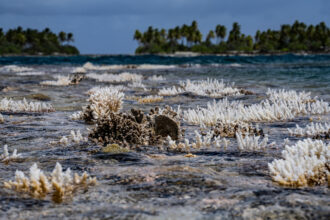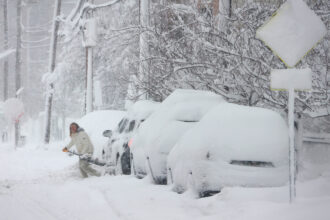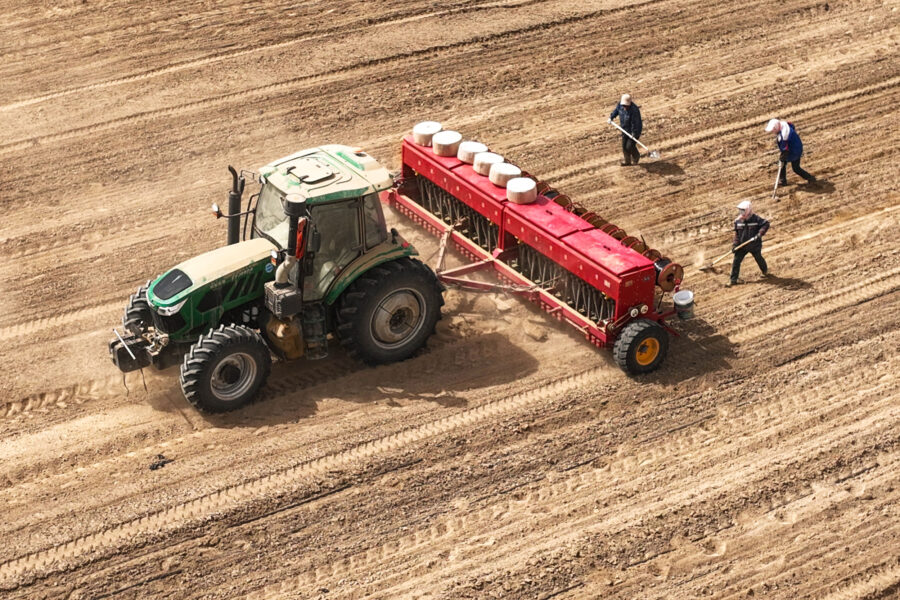“Go away bear, go away bear. Just go away.”
Dyer silently repeated that mantra as he lay on the gravel, listening to the footsteps of the bear nearby.
He wanted to let his friends know where he was—to yell to them, to wave. But his jaw wasn’t working and he could barely move his arms.
The attack had happened so fast. He had been sound asleep when something—he wasn’t sure what—caused him to stir. As his eyes adjusted and he looked up at the top of his tent, he saw two large arms, silhouetted by the bright Arctic moon, sweep across the thin nylon. Polar bear paws can be a foot wide, with claws up to two inches long. There was no mistaking what was happening.
Before Dyer could react, his tent was lifted off the ground, with him in it. He heard the fabric tearing.
“Bear in the camp!” Dyer remembers shouting. “He’s got me! Oh, he’s got me!”
The bear ripped him out of the tent, the animal’s mouth clamped around the crown of Dyer’s head. Dyer heard his jaw break and felt the bear’s teeth, which can grow to an inch and a half long, puncture his head and neck. He could smell the fishy, oily stench of the animal’s saliva.
The bear dragged him toward the mouth of the fjord, Dyer’s face bumping against its chest. He stared at its white stomach and the yellow stains on its hindquarters as it carried him farther and farther from camp. He noticed with detachment that one of his socks had fallen off.
And then there was noise coming from behind him—the shouts of his friends.
The bear turned its head toward the sounds, flipping Dyer into the air and slamming him against the ground. Without losing its grip on Dyer’s head, it continued moving toward the water.
Dyer descended into himself, overcome by a sense of calm.
Well, you’re gonna die now, he thought. Everyone is going to meet this time … I wonder what it’s going to be like.
He had sometimes thought about how it would feel, that terrifying last moment before you die. But instead of fear or panic, he found himself filled with an overwhelming sense of calm, a complete and utter acceptance of his fate. In the arms of something so strong, there was no point in holding on to hope.
At that moment, his head still in the polar bear’s jaws, Dyer saw a flash of light and heard the unmistakable whoosh of a flare gun. The bear dropped him—hard.
He heard vertebrae in his neck crack as they broke. He was in shock, mercifully, and couldn’t feel the pain.
Some people pray in life-threatening moments, but Dyer wasn’t religious. As he heard the bear walking away, he simply pleaded: Go away bear. Just go away.
The sounds of the animal’s massive paws on the gravel began to fade. Then they stopped and grew louder again. The bear was coming back.
A second flare fired—whoosh—lighting up the sky. The bear took off, its plodding footsteps growing faint in the distance.
Dyer lay motionless on the ground, trying not to make any sound or movement that might draw the bear back to him.

Next: Chapter 8
Go back to Chapter 6 | Meltdown Homepage
About This Story
Perhaps you noticed: This story, like all the news we publish, is free to read. That’s because Inside Climate News is a 501c3 nonprofit organization. We do not charge a subscription fee, lock our news behind a paywall, or clutter our website with ads. We make our news on climate and the environment freely available to you and anyone who wants it.
That’s not all. We also share our news for free with scores of other media organizations around the country. Many of them can’t afford to do environmental journalism of their own. We’ve built bureaus from coast to coast to report local stories, collaborate with local newsrooms and co-publish articles so that this vital work is shared as widely as possible.
Two of us launched ICN in 2007. Six years later we earned a Pulitzer Prize for National Reporting, and now we run the oldest and largest dedicated climate newsroom in the nation. We tell the story in all its complexity. We hold polluters accountable. We expose environmental injustice. We debunk misinformation. We scrutinize solutions and inspire action.
Donations from readers like you fund every aspect of what we do. If you don’t already, will you support our ongoing work, our reporting on the biggest crisis facing our planet, and help us reach even more readers in more places?
Please take a moment to make a tax-deductible donation. Every one of them makes a difference.
Thank you,














